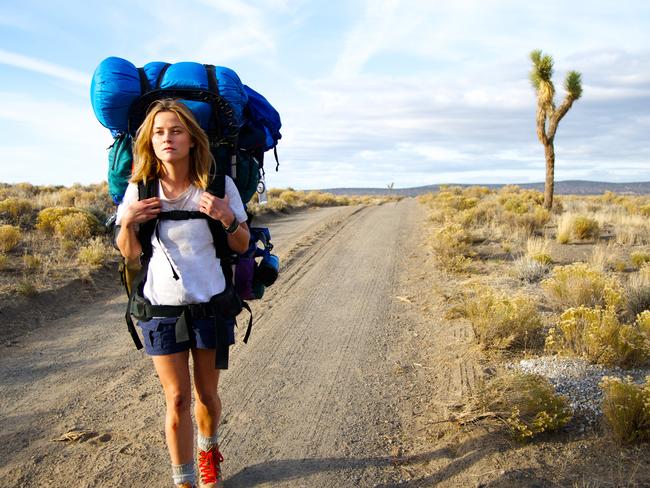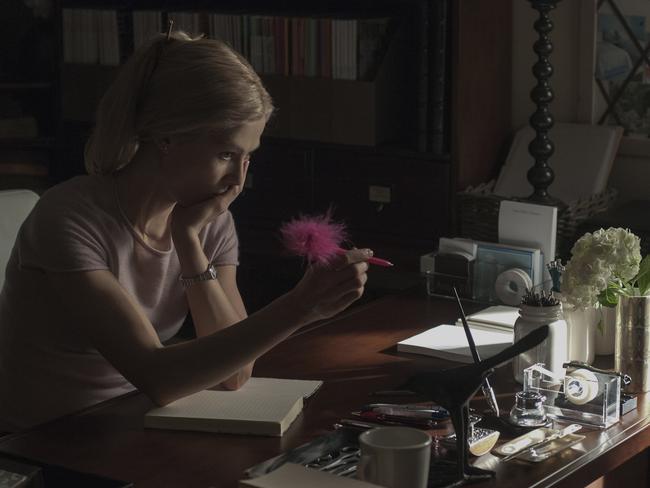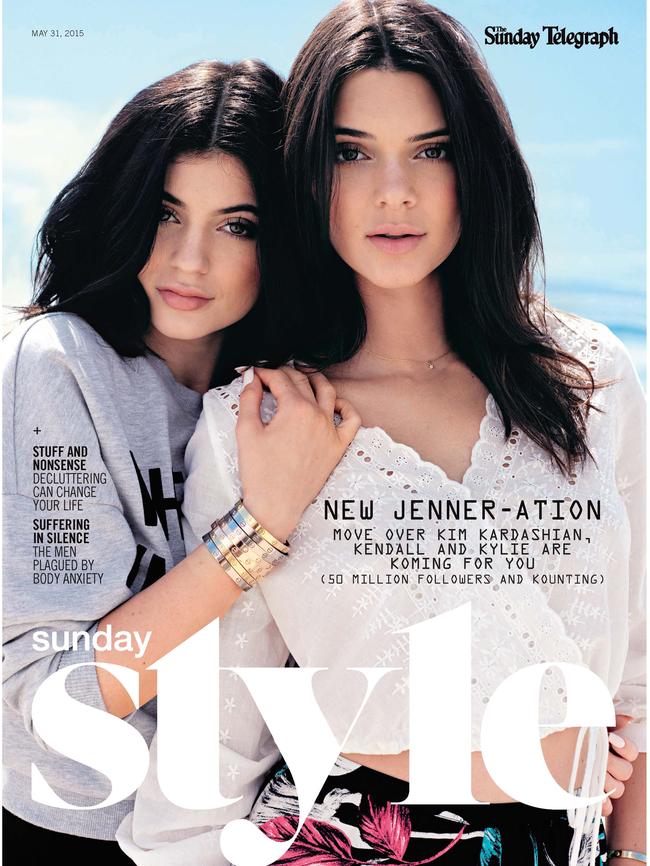Why Australian producer Bruna Papandrea is one of the most powerful women in Hollywood
BRUNA Papandrea is the most powerful woman in Hollywood you’re never heard of. The trailblazing Aussie producer is pushing the boundaries with business partner Reese Witherspoon.
BRUNA Papandrea is waiting patiently for me in the bar of a slick Sydney hotel.
Hotel guests and staff walk straight past her without batting an eyelid – they’re more interested in the C-list celebrity loitering in the lobby.
But the star-spotters have it all wrong – it’s Papandrea they should be excited about catching a glimpse of.
She might not be a household name, but the 43-year-old Aussie is one of the most powerful women in Hollywood.
Along with business partner Reese Witherspoon, Papandrea owns production company Pacific Standard, and is behind two of the biggest movies of the past eight months: Gone Girl and Wild.
Pacific Standard’s special remit is to create more roles for women in film on both sides of the camera.
“I have a lot of friends who are actresses,” explains Papandrea of their decision to start the company and focus on creating roles for women.
“I’ve read scripts for them for many years and have always been heartbroken at the type of role they were being offered – just girlfriends or wives.
“They weren’t complex women, not like [the male roles], who are at the centre of movies.”
When Witherspoon sat next to Papandrea at a dinner party and mentioned she was no longer being offered any interesting parts, Papandrea was shocked.
“It was astounding to me. If these roles weren’t being developed for big movie stars, then who were they being offered to? Who was developing them? I thought [in order to make interesting films about women] we also need more female directors, writers, technicians and cinematographers.”
Papandrea and Witherspoon met through mutual friends Isla Fisher and her husband Sacha Baron Cohen in 2012.
“They always have parties,” she says.
“Reese and I sat next to each other at a dinner and we got on really well.”
An agent suggested they talk to each other about joining forces and forming their own production company, but Papandrea was initially reluctant.
She’d just produced the well-received Warm Bodies, starring Teresa Palmer and Nicholas Hoult, and was enjoying working for herself.
“I was pretty coy,” she admits.
“I liked Reese as a person but wanted to make sure she was really serious about building a sustainable business – that it wasn’t just about creating roles for her.”
After several long conversations, Papandrea realised Witherspoon was as passionate as she was about creating more opportunities for women in film.
“I realised very quickly we were really aligned on the kind of stories we wanted to tell,” she says.
“And that she did the work; she read as much as I did. It went from there.”
It didn’t take long for the pair to prove that the public also has an appetite for stories about strong women.
The first two books they bought the rights to, Gone Girl and Wild, hit the top of the New York Times fiction and non-fiction bestseller lists at the same time.
“We were right to think audiences would be interested,” says Papandrea.
“One of the things we wanted to do was make a movie like [1987’s] Fatal Attraction; we hadn’t seen female-driven thrillers for a long time.
“So when I read Gone Girl, I was like, ‘Wow.’ Then Reese got sent Wild.
“It was the first book she sent me. If there was ever a complex, flawed female character, this was it.”

They fought off competition from bigger, established production companies to buy the production rights.
“Everyone was going, ‘How did you get those?’ People were shocked. We were lucky.”
She pauses, then corrects herself.
“Actually, I have to stop saying we were lucky.
“I just read Sheryl Sandberg’s book [Lean In] and she points out that women apologise for being successful by saying they were lucky, whereas men just say they did well.
“We got those books by reading really fast and responding really fast because we’re super passionate.
“And we have good instincts.”
Getting other Hollywood heavyweights to understand the industry’s need for more strong roles for women isn’t an easy battle.
Russell Crowe’s recent comment that “the woman who at 40, 45, 48, still wants to play the ingénue, and can’t understand why she’s not being cast as the 21-year-old” simply isn’t true, believes Papandrea.
“Russell and I are acquaintances,” she says.
“I like him enormously, but I have the benefit of being friends with many well-known actresses in their forties, and it’s just not the case that they want to play the ingénue.
“They want to play complex female characters – as men do – in different roles and in different worlds, as they get older.
“Those roles are thin on the ground, which is why we’re creating them.
“There’s still a boys’ club in Hollywood. We need to work hard to break that down.
“It’s mine and Reese’s job to try to change it.”
And slowly they are changing things; with Pacific Standard leading the charge, other Hollywood players have realised the dirth of decent material for women and are trying to do something about it.
Meryl Streep recently funded a screenwriting program for women over 40, and Rose Byrne has set up production company The Dollhouse Collective with fellow Aussies (writer/director/actor) Gracie Otto, (actor) Krew Boylan, (publicist) Jessica Carrera and (director) Shannon Murphy to tell stories with a “strong female presence”.

Although her company’s films centre around strong women, Papandrea is keen to point out they aren’t for an exclusively female audience.
“Just because we’re putting women in films doesn’t mean we’re making films for women,” she says.
“If I could do one thing, it’s to break the perception that if there’s a woman in a film then it’s a ‘female’ film.
“I’ve spoken to many men who didn’t expect to like Wild.
“But then they realised it’s a story about grief, heartbreak and redemption – these things are human, not gender specific.”
“There’s still a boys’ club in Hollywood. We need to work hard to break that down.”
Blurring traditional gender roles is a philosophy that also extends to Papandrea’s personal life.
A mum to two-year-old twins, son Roman and daughter Avalon, she and producer husband Steve Hutensky share the parenting load.
“I have a husband who is really hands-on,” she says.
“Sometimes he’ll be the main parent and I’ll be working for two months. And sometimes we’ll switch – at the moment, he’s producing a film and I’ll pick up some of that slack.
“For me that’s great, there’s no defining our roles by being female or male – it’s about what’s happening in both of our lives at the time.”
As if balancing a high-flying career with a family isn’t challenging enough, in 2010 Papandrea was diagnosed with lupus, an autoimmune disease that causes chronic joint pain and tiredness.
“There are always positives,” she says.
“It’s made me much more conscious of looking after myself.
“I know when I eat well and exercise, I can keep it under control.”
Papandrea has built her stellar reputation in the industry over the past 20 years.
Born in Adelaide, she dropped out of law school and started work as an assistant at a commercial production company.
“I loved making commercials, creating something from nothing and telling stories,” she says.
She didn’t have Hollywood in her sights – just a desire to make great films.
“My one rule was to never let money be my motivator for making decisions. I always felt it was better to base it on which film I’d like to make or not.”
In 2000 she made Better Than Sex, starring David Wenham, and took it to several film festivals, which is how she met late British film director Anthony Minghella.
“That was my big break,” she recalls.
“Working with him and Sydney Pollack [as production executive at their company, Mirage Enterprises] sent my career into a different stratosphere.”
After five years working in London, she moved to the US, where she produced movies including Smart People (starring Sarah Jessica Parker), the Oscar-winning Milk (Sean Penn), and All Good Things (Ryan Gosling).
She now lives in LA, but believes her Australian upbringing has contributed to her achievements.
“Australians are very hardworking,” she reflects.
“We have a can-do mentality. Americans like our honesty.”

Despite the success of Pacific Standard, Papandrea believes there’s still plenty to strive for when it comes to gender equality in Hollywood.
“I’ve become more of a feminist because I’ve realised how far we have to go,” she says.
Patricia Arquette’s plea for equal pay for women in her Oscar acceptance speech earlier this year resonated with Papandrea.
“It’s totally true and shocking [that women aren’t being paid the same as men],” she says.
“Reese and I are in the position now where we’re being offered a lot of stuff – and sometimes the negotiation is tough. We just stand our ground.
“Pay us our quote or don’t work with us. I’ve learnt that if you’re not prepared to walk away then you have no negotiating power.
“I think that’s particularly tough for women. Culturally, we’re still evolving. That has to change. There shouldn’t be any disparity.”
Next, the pair is tackling television.
“We’re doing a TV series based on an Australian book called Big Little Lies,” she says.
“It stars seven women, and Nicole Kidman and Reese are in it. It’s really exciting.”
They’re also looking to develop strong female characters for a younger audience, including making a film based on the children’s book series Pennyroyal’s Princess Boot Camp, about girls who enrol in a school where they are trained to become warrior princesses.
“It’s really important to me that we make stories with women of all ages,” she says.
Papandrea and Witherspoon are delighted with the critical success their films have received, but believe it’s their commercial success that really stands the future of women in Hollywood in good stead.
“One of the most important things that’s happened to us is that our movies have made real money,” says Papandrea.
“That gives people no excuse to not keep making them.”
You can own Wild on Digital HD from June 3, and on Blu-ray and DVD from June 17.


